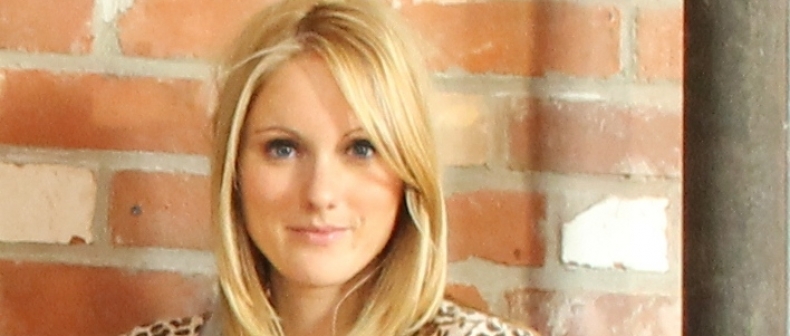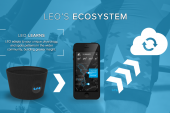
Movers and Starters is an exlusive series that profiles the indivduals who drive Toronto’s startup community.
Last week, the influential Toronto-based tech website BetaKit celebrated its first birthday. For its Managing Editor, Erin Bury, the site’s birthday was the culmination of everything she has done in Toronto’s startup space since entering it in 2008. In that time, Bury has seen the highs and lows of working at a startup firsthand. Moreover, she has helped document the space by writing for a variety of publications, including the Financial Post. In a way, there’s almost no one else in Toronto is better situated to talk about the city’s startup community, which is exactly why we reached out to her for this interview.
Tell us a bit about yourself.
I am the managing editor at BetaKit, which is an emerging technology publication owned by Postmedia. BetaKit was launched by Sprouter, which is where I was formerly in charge of communications, events, and public relations. I’m a journalism grad, I have a column in the Financial Post about startups, and I’m a tech commentator for CTV News.
You got your start in the startup space with Sprouter. Want to tell us how you got involved with the company? And for those readers that haven’t heard of Sprouter, explain what the company does?
Through my work I’ve interviewed hundreds of entrepreneurs, and almost all of them have one thing in common: they all wanted to be entrepreneurs– they always had that desire to make their own money and be their own boss.
I never really had that.
I grew up in a house where my mom and step-dad both worked for Nortel–so you can imagine what it was like when Nortel went bad. My parents always worked in an environment where they had a boss, worked from 9 to 6, and relied on their annual salary and bonus, so that was the kind of job I envisioned for myself. At that point I really didn’t know about entrepreneurship.
When I went to university, I majored in journalism. Both my biological parents actually studied journalism as well–my dad got a job as a community reporter after university, and my mom went into marketing and communications after getting her degree. So I saw journalism as this path you could take that could take you in a variety of different directions and, regardless of whether or not I wanted to be a reporter, I decided to see where it would take me.
I took a public relations class in my fourth year, and after school I went to work for a PR agency for about a year. I enjoyed my time there, but it wasn’t for me. I didn’t like working with ten clients at a time and, being in an entry-level position, I wasn’t behind the agency’s strategy. In an entry-level position, you’re making media lists, contacting journalists–most of whom are not happy that you’re calling them–and other stuff like that. But then through my mom I met Sarah Prevette, the founder of Sprouter.
My mom said, “I work with this girl that’s really entrepreneurial, and I think you could learn a lot from her.” So we had dinner a few times over the course of a couple of years, and at one our later dinners, Sarah said, “Oh, I’m starting this company called RedWire (which later rebranded as Sprouter) and I need a community manager.” This was the fall of 2008, so way before community manager entered into the digital lexicon, and the first question I asked her was “What’s a community manager?” She basically said everything that I had done for the past year-and-a-half at my agency. I would like to say that I said, “That sounds great. I’m in!” But in reality, it took a lot of soul-searching. Sarah asked me to join her right at the beginning of the recession, and I was so used to this example of working for the man. The idea of a startup sounded interesting, but it also sounded risky. Looking back, however, that was obviously one of the best decisions I’ve ever made.
RedWire launched the day that I joined the team. The idea behind the site was to connect entrepreneurs online. Sarah got the the idea for the site when she had started one of her other businesses. She had a question for an angel investor who told her that unless he was an investor in her company he wasn’t going to help her out. So Sarah said, “Screw this! I’m going to get a community together of fellow entrepreneurs, so that we answer each other’s questions and give each other advice.” It originally started as a kind of social network, then it evolved into a Twitter-style social network, and in its current iteration it’s a kind of Q&A for entrepreneurs.
After two-and-a-half years of operation, Sprouter ran into some trouble. Can you tell us about the issues the company started to face and what you learned from that experience?
There’s obviously been a lot of criticism of Sprouter and the fact that we didn’t have a revenue model initally. I think the consensus was that the company shutdown because, while everyone loved the idea of the site and community it helped fostered, there was no plan to monetize the site’s features– at least that’s the sense that I got from the online feedback. We were making money off our startup events, and we had developed this new version of the site that involved paid accounts–both for individuals and organizations. So we definitely had a plan in place to help the company turn a profit, but it became a matter of running out of time and resources to implement those plans. I understand how it looked for someone on the outside looking in; I probably would have had those same questions.
That said, I try to be positive in everything I do, and if there’s one thing my experience at Sprouter taught me, it’s that you have to have a thick skin. Whether it was replying to comments on blogTO (Bury used to write articles for the tech section on blogTO) or replying to a negative comment aimed at Sprouter, you would not believe the amount of times that I typed out a negative response only to backtrack, delete it, and instead write something like, “I would love to help you understand our strategy behind so-and-so feature. Please shoot me an email.” I quickly realized that haters are actually good to have, because, as Dave McClure said, “You can’t iterate around indifference.” If someone tells you that they hate your company, then you still can turn them into a fan. Sometimes the people who write those comments genuinely dislike you or your company, but, most of the time, they’re just looking for validation or feedback.
Bury with Sarah Prevette in June 2011 at the Dell Women’s Entrepreneur Network Conference in Rio de Janeiro, Brazil.
What was it like, emotionally, in that two-week period in which Sprouter shut down and then was acquired by Postmedia?
Well, first I felt terrible for Sarah. I’m sure that was one of the worst days of her life. I wasn’t even with her that day, because I think she turned off her phone and went for a walk in the woods. Of course, it was hard for the rest of our team as well, but at the same time, we were realists: we understood that’s what happens when you run out of runway, and there’s just not much you can do about it. I was confident that there was going to be other opportunities for me; I thought I had built up a strong enough network and that my work spoke for itself.
We were then acquired, and it was one of those things where you had to get your head back into it and think, “Okay, this is amazing news, but at the same time, how are we going to make good on this amazing opportunity we’ve been given?” Luckily, there were about five weeks there where I got to take an extended summer vacation, which, I’m not going to lie to you, was awesome. Sarah, on the other hand, was stuck in boardrooms and didn’t get a vacation at all.
Personally, I think it was a great time for me to reevaluate what I was doing; after three years at the job, I was tired of being a community manager. Besides, once you’re a community manager in a company where the marketing department consists of exactly one person – you – there’s not much room to advance. So it was a chance for me to step back and say, “Yes, I would love to rejoin the company, but can we look at how we can add to the team and bring in people to change my role in the company,” which is exactly what we did. As soon as we came back, I changed my title to… oh my god, what was it? Right, Director of Content and Communications. We also started looking for a new community manager to replace me. Afterwards, I became more involved in the communication strategy of the company and I helped figure out a new vision for the site.
What ways, if any, did your experiences with Sprouter shape BetaKit?
At Sprouter, I was producing the site’s newsletter on a weekly basis, and doing some writing on the side. While producing the newsletter, I was constantly getting pitched these amazing story ideas by entrepreneurs. Unfortunately, the newsletter only allowed me to showcase those ideas in small snippets, not actual articles. We also noticed that the amount of pitches we were recieving was correlated to a period of flux in tech journalism–Techcrunch was recently purchased by AOL, there were staffing changes in publications like Venturebeat, Business Insider became more known for posting slideshows than actual news, and a site like Mashable started to focus on social media instead of startups–so we saw this gap in the market: mostly in terms of journalistic reporting on emerging technology, not necessarily the Apples, Googles, and Facebooks of the world. So that’s where the idea came from, and we had it before Sprouter shut down. When we were acquired by Postmedia, it seemed like such a natural progression to build a site like BetaKit.
Our idea with BetaKit was to avoid building a publication that was soley supported by ads, because we felt–and I still feel this way–that supporting an online publication with just advertising is a sure-fire way to lower a site’s journalistic standards. So we came up with the idea to pair the publication with this kind of trend research product that would help serve as a business model for the site. In a way, BetaKit has become a test to see what tech journalism could be in the future. Moreover, the site is also a chance to see if we can find an alternative to the advertising only web publication while sill getting a chance to write what we’re passionate about in a way that is journalistically sound.
Speaking of your work as a writer… Since 2008 you’ve also played an integral role in documenting Toronto’s startup community. How has the community changed in the time that you’ve been covering it?
There’s so much more infrastructure now–from investment firms, to startup accelerators, to just the amount of successful startups that have gone through the startup cycle. I remember the very first event we held in Toronto: Rypple was one of the startups that presented at the event, and since that event they’ve gone on to sell for something like $100 million. It’s been amazing to see all these startups come full circle; when you met them, they were just at the start of their life as a company, and now they’ve gone on to become successful. I also think there has been an increase in the number of entrepreneurs, as well as an increase in the number of startups with global attention–like 500px, for instance–and an increase in the number of acquisitions. In 2008, there were a ton of entrepreneurs and startups in Toronto, but there weren’t always the resources to back them up or the infrastructure to show them off.
Bury with Andrea Lown at Dell’s Women Entrepreneur Network Conference in Delhi, India.
Someone once told me that it takes a great network to launch a startup. In your case, it seems that two really strong women helped you along the way–Sarah Prevette and Andrea Lown, respectively. Want to tell us about these women and how they impacted your life and career?
I’m not overstating it when I say I owe Sarah my whole career. She took a chance on this 22-year-old kid that was sitting across from her, asking what a community manager was. If she hadn’t done that, I can honestly say I don’t know where I would be right now. The fact that she’s no longer at Sprouter is weird to me (Prevette has since gone on to work on other projects), because we’ve been on this journey together for such a long time; almost everything that is a quintessential startup activity we’ve probably done together. She showed me that you can be an entrepreneur, take risks, not know what the outcome will be, and not worry about it. You just know that you have to trust in your own ability, your own ideas, and even if it doesn’t turn out as planned–aka Sprouter–there can be a silver lining. The biggest impression she left on me is that I can start my own business. I never wanted that for myself, and I never believed that I could do that, but over the past five years and at every possible opportunity she has said, “If you don’t start a business now, I’m going to be really mad at you.”
Other people in the community like Andrea Lown, Catherine Graham from Rightsleeve, and all of these other amazing female entrepreneurs in the city mystify me. So many of them have children, husbands, and houses, but I have no idea how they balance those while always working–it doesn’t matter if it’s midnight or 3 a.m., they’re almost always working away. I live in a six-hundred square foot condo, and I still find myself trying to find time to vacuum my condo. They’ve taught me that you can have a successful business into your thirties and have a great family. Granted, it’s not always pretty and it takes a lot of planning.
The biggest thing I’ve learned about the whole women in entrepreneurship is the that women hate the question: “What’s it like being a female in a startup?” They don’t want to be treated any differently. Sarah hates that question, because she doesn’t identify herself as a female entrepreneur, she identifies herself just as an entrepreneur. For Sarah, it shouldn’t make a difference whether she’s a female or not. What should be significant is if she has a good product idea, and whether that product is something that people want.
You’ve been at this for a while now–any advice for those looking to take the plunge?
My biggest advice to new grads is to take risks; the only way you’re going to get ahead in life is if you take risks.
On the entrepreneurial front, I truly believe that one of the only ways to get rich in this world is to start your own company. It won’t always happen, and you will fail a lot, but there’s is something to be said about being your own boss. Yes, it’s challenging; you think about your company 24/7, and how to overcome problems it faces. I don’t think everyone is meant to start their own company, but those that do: don’t let anything stop you.
On that front, build an amazing team–whether that’s co-founders, developers, or investors–as your team is what will get you through the start; build a product that people need, not that you think they want–and if that involves doing 200 customer interviews before you even write a line of code, then do it; and raise money even if you don’t think you need it, because everything takes three times longer and costs ten times as much.
You’ve told us a lot about your work, but what are some of the things that inspire and motivate you beyond what you do to pay the bills?
Two or three years ago I realized that, beside hanging out with a select group of friends, all I did with my social life was go to entrepreneurial events. So I started taking guitar lessons. Beyond that, I would say that travel drives me as a person. I’ve been fortunate to travel to India and Brazil and all around the US and Europe as a part of Sprouter. On a personal level, in the last year I’ve gone on vacation to Dubai and Italy. I’m not one of those people that dreams of white picket fences: I dream of traveling the world, and if you can incorporate that into your work, then do it. And, like every 27-year-old girl, I love hanging out with friends, watching the Oscars and The Bachelor.
Finally, what’s next for you?
If you asked me what I was going to do in the next 5 or 10 years, I would have no idea. Every entrepreneur should try to answer the question, “Wouldn’t it be awesome if?” And I feel until I can answer that question with something amazing, then I’m not going to go branch out on my own. Hopefully it will come to me soon, though.
Is there a local entrepreneur you would like to see profiled on the Toronto Standard? Email Igor Bonifacic at igorbonifacic [at] gmail [dotcom] with suggestions.
____
Igor Bonifacic is a writer working for the Toronto Standard. You can follow him on twitter @igorbonifacic.
For more, follow us on Twitter @TorontoStandard and subscribe to our newsletter.














